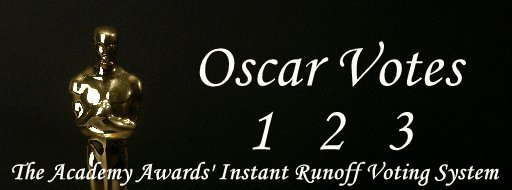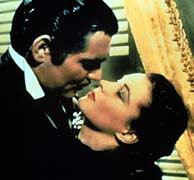Oscar season 2011 is over. At the Academy Awards ceremony last night, The King’s Speech took home the coveted Best Picture award, besting such prominent contenders as The Social Network and Inception. Just like last year, the winner of the award was chosen using the Academy’s “preferential voting” system, otherwise known as instant runoff voting. And once again, the results refute the notion that the preferential voting system tilts the playing field in favor of any certain kind of film.
In the wake of the ceremony, there has been speculation in some quarters that The King’s Speech might have been helped along to victory by the preferential balloting method. But a quick look at results from this year and last shows that this argument stands on shaky factual ground. Just as The Hurt Locker did last year, The King’s Speech won both the Best Picture award and the prize for Best Director. Unlike the Best Picture category, which was expanded to a ten-candidate preferential ballot contest last year, the Best Director category is decided by a more traditional formula: Five nominees are selected, and the winner is chosen by a simple plurality vote. If there were, as skeptics claim, a built-in advantage for certain candidates in the IRV system, then we would expect the Best Director category to produce results different from the Best Picture outcome. But in each of the first two years of preferential balloting, the results have been the same, with the Best Picture winner also taking home the Oscar for Best Director. This would suggest that, far from radically upsetting the traditional system, the introduction of IRV in the Best Picture Category has simply provided a means to protect fair outcomes while expanding the field to ten candidates.
Rob Richie, Executive Director of FairVote, said:
Many of those who either criticize or praise these best picture outcomes based on use of IRV are missing a key point. It’s upholding fair outcomes, not allowing winners that couldn’t win with the old plurality voting system. IRV and plurality will usually pick the same winner -- indeed, they always would if there were only two choices. When the two systems don’t pick the same candidate, IRV is fairer, as it would suggest that plurality voting would have resulted in a winner who needed a split vote to win. Much of the conjecture of IRV’s impact has been based on a lack of understanding that IRV is a one-person, one-vote system designed to elect the movie that has a lot of first choices, but also beats the other top movies when matched against them one-on-one. A movie is not going to win by being everyone’s second choice, and a movie won't win based on the order of elimination of the weakest movies. It's called an instant runoff for good reason: IRV will elect the movie that more voters prefer to its top competitor.
This year’s Best Picture result was accurately predicted by the OscarVotes123 poll, in which voters were given the chance to rank all ten candidates in order of preference – just as the Academy members did on their ballots. The poll provides a round-by-round breakdown that shows which voters had their ballots counted for which candidates, providing an illustration of an instant runoff in action. OscarVotes123 plans to conduct another poll next year. In the mean time, interested readers can create their own polls at www.DemoChoice.org, a free tool for conducting IRV elections.


